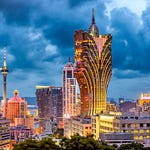Welcome to East West Hurricane! 🌪
We update you on the most essential news from Asia in tech, media, and business—the things you need to know that you probably haven’t heard in Western media.
Follow us on Twitter and Instagram! ⚡️
The Chinese Bottled Water Billionaire You Haven’t Heard Of 💦
Chinese company Nongfu Spring made its debut on the Hong Kong Stock Exchange earlier this week, surging 85% higher than their IPO price. Nongfu Spring is a company headquartered in the city of Hangzhou that makes bottled water. The company was founded by Zhong Shanshan, who briefly became the third richest man in China with the share price at its peak, giving him a temporary net worth of $50 Billion.

Nongfu Spring was founded in 1996 at Qiandao Lake in Zhejiang province, an area known for its natural beauty. Over the years, the company has built a strong brand around building ‘natural products,’ primarily focused on bottled water but also extending into tea, coffee, and other beverages. The investor interest in the company seems to be based on the new post-Covid trend of Chinese consumers placing importance on their health and wellness. With a market cap of around $48 Billio, Nongfu still has lots of room to grow and capitalise on what is becoming a global trend of increased demand for products perceived to be healthy and natural.
India’s Film Industry Targeted by Western Streamers 🇮🇳
While the Indian film industry has been struggling due to the coronavirus, Western streaming companies like Netflix, Disney, and Amazon have been acquiring several Bollywood films to host on their platforms. Struggling Bollywood studios have sold blockbuster films that were originally intended to receive a theatrical release. Since India is a huge priority market, now these Western platforms can provide better Indian content for their customers.

India is a huge entertainment market - the country produces more films and sells more movie tickets than any other country in the world. The tough situation for Bollywood studios is similar to other markets around the world, such as the US and China. In the film industry, there has been this concept of the theatrical window—usually several weeks or months where a new film is distributed through theaters and is not allowed to be broadcasted on any other platform, like an online streaming platform. In China, the US, and now India, the theatrical window has been shattered by the coronavirus, as companies like Disney are now taking blockbuster films directly onto streaming platforms. And across all three of these countries, movie theater companies are angry at the ‘violation’ of the theatrical window on top of their own coronavirus-related closures. Disruption in the entertainment industry is a global phenomenon, and the stakes are very high in Asian countries like China and India.
Surveys and Data on American Business in China 📊
The South China Morning Post reported on data released by the American Chamber of Commerce in Shanghai, who creates an annual survey for American businesses operating in China. In this world of increased political and economic tension, it’s fascinating to parse through the data in order to understand how American businesses in China have been affected. 92% of the respondents say that they have no plans to leave China and 5% say that they do plan to leave the country. 85% of the respondents are companies who have operated in China for over a decade. One major concern brought up by American companies—if President Trump actually bans WeChat and this applies to American businesses in China, this could be a huge problem. Another concern reflected in the survey—many Chinese workers have less of a desire to work for an American company, given the current relationship between the two countries.

You have to wonder what’s going through the heads of people running American companies in China. The biggest source of fear must be the lack of certainty around what’s going to happen next in the US-China relationship. Also, right now China’s economy is one of the world’s healthiest and fastest growing in a post-covid situation. Companies who have a long-term strategy in China seem willing to ride out these short-term fluctuations. The way I see it—no matter what happens over the coming months, China’s mid- to long-term importance will continue to increase. And every international business should keep that in mind.















Share this post